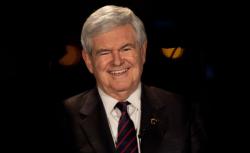COLUMBIA, S.C.—A lone Democratic consultant wandered the halls of the downtown Hilton, gawking at Republicans who had come to fete Newt Gingrich. The consultant had spent his day giving Swedish conservatives a course in local politics. What to tell them about Gingrich? As an expert, he had no idea. As a Democrat, he was blissed out.
“I’ve been saying all year that they’d be crazy not to nominate Mitt Romney,” said the consultant. He scanned the hallway, clogged with people wearing NEWT 2012 buttons or vintage Ronald Reagan swag, zigging toward the room where Gingrich would speak after his huge win in the South Carolina primary. “They’re crazy.”
Who were these crazy people? They were Gingrich voters, Frankensteins stitched together from the parts of other, extinct conservatives. Some of them used to be Herman Cain backers—look, there’s the “Black Hawk Down” hero Mike Steele, a Cain supporter who used to lead the Pledge of Allegiance at Cain rallies. Some were Michele Bachmann fans—look, there’s 20-year-old Taylor Mason, who jumped right from Bachmann’s campaign to Gingrich’s and spent three weeks setting up events in the Low Country. Perhaps they were like the Sciolaros, a family from Kansas who trekked across the country for Rick Perry, frowned when he quit, then signed up with Newt.
Gingrich voters are not, necessarily, crazy about Gingrich himself. In his victory speech—which did, admittedly, come after 15 minutes of frenzied pushing through fans and cameras—the candidate paused from his recycled stump speech lines to add a new and not especially humble brag. Exit polls had revealed that two in three voters made their decision, in part, based on the televised debates. These voters broke 2-to-1 for Gingrich over Mitt Romney. But to say that Gingrich merely outdebated Romney was profoundly, fundamentally wrong.
“It’s not that I’m a good debater,” Gingrich said. “It’s that I articulate the deepest felt values of the American people.”
This was hilarious, and it was true. Gingrich had gained ground by punishing the media in Monday’s and Thursday’s debates. Fox News’ Juan Williams asked Gingrich if he understood that black voters were insulted when he talked about food stamps; CNN’s John King asked if he had anything to say about a new interview with his ex-wife, Marianne. In both cases, Gingrich isolated the questions and made them about the media. He was not a candidate. He was a vessel for patriotic, Republican rage.
“They would like to attack any Republican,” Gingrich told King. “They’re attacking the governor, they’re attacking me. I’m sure they’ll presently get around to Senator Santorum and Congressman Paul. I am tired of the elite media protecting Barack Obama by attacking Republicans.”
The “elite media” isn’t running stories about the personal scandals of those other guys, because those scandals don’t exist. That wasn’t the point: Gingrich was saying that all criticism of Republicans from the media should be suspect. He expanded on that in his victory speech. The hated elites, he warned, “have been trying for half century to force us to quit being American and become some other kind of system.” He knew it, and on this night in South Carolina, the voters knew it too.
Before Gingrich got to the Hilton, I drove from Charleston to Columbia, attempting to find his people. It was easy. The Gingrich voter proudly announced who he’d voted for, saying that he made up his mind in the last week, or after the last debate. (Exit polls backed this up: Voters who decided in “the last few days” went 44-22 for Newt over Romney.) After a while, the only differences between their endorsements were the verbs they used to describe what Gingrich would do to Barack Obama in debates.
In Charleston, a voter named Jayne Harmon claimed that Gingrich would “dismantle” the president.
In Monck’s Corner, I learned that Gingrich would “humiliate” him. In Columbia, I was told that Obama would be “lacerated” or “annihilated.” When Gingrich spoke, and repeated his promise to challenge Obama to seven debates, a biker named Vincent Sbraccia hoisted his sign and screamed: “Wipe the floor with him! Wipe the floor with him!”
A lot of these people considered Gingrich a genius, or at least a first-class intellectual. But before they went for him, they’d thought Herman Cain—who didn’t pretend to know much—would eviscerate Obama, too. They saw more ads for Gingrich than they’d ever seen for Cain, but they saw yet more TV ads and pieces of mail for Mitt Romney. But Romney, who recites America the Beautiful in his campaign speeches, didn’t convince them that he hated “the elites.” Gingrich did. He’d outdebate Obama because he didn’t accept the notion that Obama was a competent, eloquent president. They didn’t accept it, either.
How many more times can Gingrich pull this off? South Carolina was an usually good state for him—he never made a speech without mentioning that he was a “Georgia conservative”—but not uniquely good. In 2010, the Republican base was anti-elite enough to nominate right-wing outsiders for governor of Maine, Illinois, and Florida; for senator in states from Nevada to Delaware to Kentucky; and for House seats from the Arizona-Mexico border to upstate New York. Some of these people actually won elections. Now that the other, more credible outsider Republicans are out, Gingrich is in a position to win more primaries. After all, the “craziest” result in the South Carolina exit polls was the finding on “electability.” Forty-five percent of Republicans said they were choosing the candidate with the best shot of beating Obama. Fifty-one percent of them voted for Gingrich. He agrees with them. He knows what they know about the president. Of course he can win.
